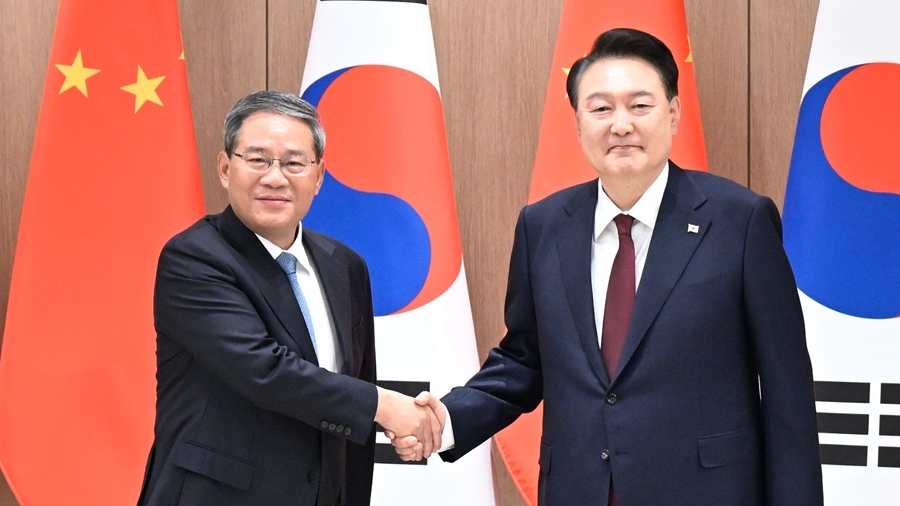
Chinese Premier Li Qiang (L) shakes hands with South Korean President Yoon Suk-yeol in Seoul, capital of South Korea, May 26, 2024. [Photo/Xinhua]
By Gabriela Bernal
Thirty-two years after establishing diplomatic ties, the relationship between China and South Korea appears to face difficulties. President Yoon Suk-yeol has decisively shifted South Korea's focus toward the United States, prioritizing this alliance in terms of diplomatic, security and economic issues. However, Seoul's current foreign policy is risky, unbalanced and shortsighted.
Given the complex geopolitical environment South Korea finds itself in, Seoul has long been forced to adopt a carefully balanced diplomatic strategy, particularly regarding China and the U.S., to ensure not just its own security and national interests but also to maintain regional stability. This was the path taken by successive South Korean presidents.
For example, Moon Jae-in, who was the president from 2017 to 2022, strived to maintain a balanced foreign policy vis-a-vis both China and the U.S. Unlike Yoon, Moon opposed the formation of a military alliance involving Japan and the U.S., aware of the potentially destabilizing consequences of such a move.
But the relationship between China and South Korea has deteriorated, with a recent Global Times Institute survey conducted in South Korea finding that "only 11 percent of respondents believe the relationship has become closer and friendlier." The strategic rivalry between the U.S. and China has a further negative impact on China-South Korea ties, with the latter choosing to place itself in the U.S. camp.
This strategy is unlikely to bring about positive long-term benefits to South Korea. China remains South Korea's most important economic partner, with trade data for June showing that exports to China were "propelling the growth trend" of Seoul's exports. While Seoul has been aiming to financially "decouple" from China under Yoon, this will be impossible for the foreseeable future.
Besides the economy, it will also not be in Seoul's best interest to put all its eggs in Washington's basket regarding security issues. While Yoon has tried to expand security cooperation with both Washington and Tokyo through initiatives like the Camp David summit, the Nuclear Consultative Group, and repeated bilateral and trilateral military exercises, such measures will not have the desired deterrent effect against external threats. In fact, a large portion of the South Korean public is keenly aware of this, with an increasing number not trusting the U.S. would adequately defend its ally in case of an external attack. As a result, nearly 80 percent of South Koreans now support a domestic nuclear weapons program.
Not only is this highly alarming in terms of security on the peninsula, but such talk alone could result in a regional arms race that could plunge Northeast Asia into a dangerous quagmire. In short, neither excessive dependence on the United States for South Korea's defense nor the development of an independent nuclear arsenal offers a viable solution to Seoul's security concerns.
With the security situation on the peninsula already volatile, South Korea must return to a balanced diplomatic strategy and prioritize rebuilding a strong partnership with China.
The upcoming U.S. elections mean doing so now is all the more urgent. While South Korea has placed all its bets on the U.S., Washington has countless other allies and partners around the world demanding its attention, not least now with the conflicts in Ukraine and Gaza. As such, Seoul must take off its rose-colored glasses and expand its foreign policy focus beyond Washington.
There is ample room for South Korea to expand cooperation with China. Even though the two countries don't agree on certain issues, this shouldn't mean that exchanges come to a halt, communication remains weak, or that issues of common concern get thrown aside.
There are various ways the two countries can revive their decades-long relationship. For one, stalled negotiations to update the bilateral free trade agreement (FTA) should resume, which would result in economic benefits for both. Besides the bilateral FTA, the trilateral FTA with Japan can also be prioritized, as the leaders of the three countries hinted at when they held a summit in May. This would also contribute toward greater regional cooperation, stability and economic growth for all three countries.
South Korea and China can also enhance cooperation on common issues such as climate change and natural disaster preparedness. For example, the two countries have previously agreed to expand cooperation on issues such as air pollution and carbon emissions. Besides, they can expand their December 2023 decision to update the memorandum of understanding on healthcare cooperation. Talks have since continued in April and various plans related to cooperation in the public health sphere are likely to ensue as a result.
Finally, Beijing and Seoul can also set a stronger foundation for the relationship in the long term by enhancing exchanges in the field of education. After trilateral ministerial talks including Japan on education cooperation held in May, they can take further steps to boost bilateral education exchanges at various levels.
From a long-term perspective, it is in Seoul's best interest to maintain a balanced diplomatic strategy, as this will be beneficial not just to its national security and economy but also contribute to overall regional stability.
Gabriela Bernal, a special commentator for CGTN, is a Korea analyst based in Seoul, South Korea.

 中文
中文



